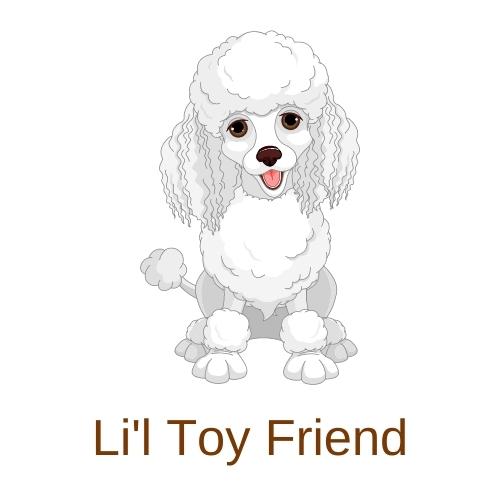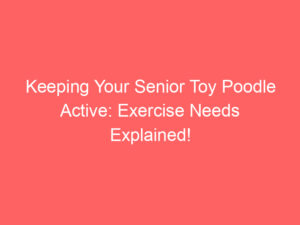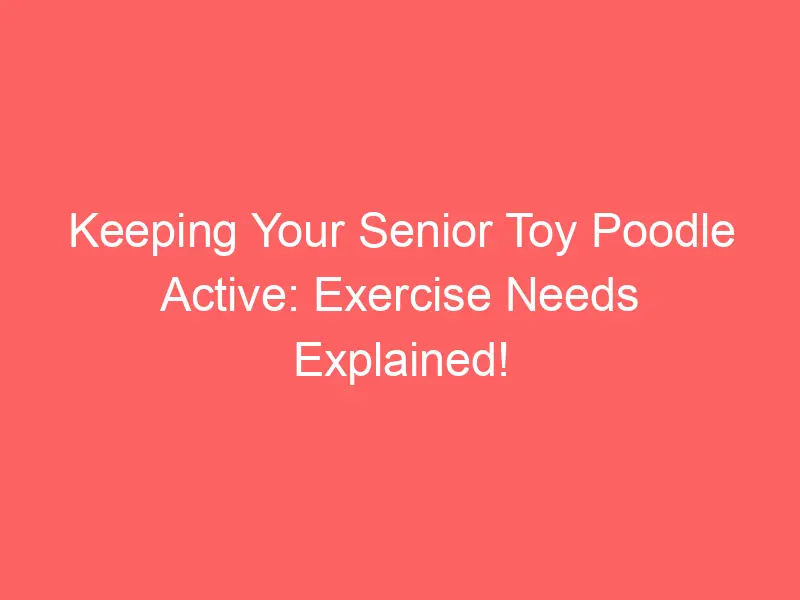Introduction to Senior Toy Poodle Care

As your beloved toy poodle transitions into their golden years, their care requirements will naturally change. This guide will help you understand the importance of specialized care for senior toy poodles and provide an overview of the changes that occur in toy poodles as they age.
-
- Understanding the Importance of Specialized Care for Senior Toy Poodles
Senior toy poodles, like all senior dogs, require specialized care to ensure they remain healthy and comfortable in their later years. As they age, toy poodles may experience changes in their metabolism, mobility, and overall health. Providing specialized care tailored to their changing needs is crucial. This includes adjusting their diet to a senior-specific formula, incorporating gentle exercise into their routine, and scheduling regular vet check-ups to monitor their health.
-
- Overview of the Changes That Occur in Toy Poodles as They Age
As toy poodles age, they undergo several changes. Physically, they may start to slow down and have less energy for play and exercise. Their senses, such as sight and hearing, may also start to decline. In terms of health, they may be more prone to diseases and conditions common in older dogs, such as arthritis, dental disease, and heart problems. Understanding these changes can help you provide the best possible care for your senior toy poodle.
In the following sections, we will delve deeper into the specific aspects of caring for an aging toy poodle, including understanding their aging process, maintaining their health, grooming needs, and managing potential health issues. Remember, your toy poodle has given you years of unconditional love and companionship, and now it’s your turn to ensure their golden years are as comfortable and fulfilling as possible.
Understanding Toy Poodle Aging Care
As your beloved Toy Poodle ages, it’s important to understand the changes they may experience. This knowledge will help you provide the best care possible for your furry friend.
Physical Changes in Aging Toy Poodles
Just like humans, dogs also experience physical changes as they age. Let’s take a closer look at some of the most common physical changes in aging Toy Poodles.
- Changes in energy levels and mobility: As Toy Poodles age, they may not be as energetic as they once were. You might notice your dog taking longer naps or getting tired more quickly during walks. This is a normal part of aging, but it’s important to still ensure they get regular, gentle exercise to maintain their mobility and overall health. If you notice any drastic changes in your dog’s energy levels or mobility, it’s best to consult with a veterinarian.
- Changes in appetite and digestion: Aging can also affect a Toy Poodle’s appetite and digestion. They may eat less than they used to, or they might have trouble digesting certain foods. It’s crucial to monitor your dog’s eating habits and consult with your vet if you notice any significant changes. They can recommend a diet that’s suitable for your aging Toy Poodle, ensuring they get all the nutrients they need.
Understanding these physical changes can help you provide the best care for your aging Toy Poodle. Remember, every dog is unique and may not experience all these changes. Always consult with your vet if you have any concerns about your dog’s health.
Mental Changes in Aging Toy Poodles
As our beloved Toy Poodles age, they may experience not only physical changes but also mental changes. It’s crucial to understand these changes to provide the best care for our senior pets.
-
- Signs of cognitive decline in senior toy poodles
Like humans, Toy Poodles can experience cognitive decline as they age. This can manifest in various ways, including confusion, disorientation, changes in sleep patterns, and decreased interaction with family members. They may also show signs of anxiety or restlessness, and in some cases, house training may regress. It’s important to note that these changes can be subtle and gradual, so regular check-ups with your vet are crucial to detect any early signs of cognitive decline.
-
- Strategies for maintaining mental stimulation and health
Mental stimulation is key to maintaining a healthy mind for your aging Toy Poodle. Regular playtime, puzzle toys, and training exercises can help keep their minds sharp. Additionally, a balanced diet rich in antioxidants and omega-3 fatty acids can support brain health. Regular vet check-ups are also essential to monitor your pet’s mental health and detect any potential issues early.
Remember, every Toy Poodle is unique, and they age at different rates. Regular observation and veterinary care can ensure your pet remains healthy and happy in their golden years.
For more information on cognitive decline in dogs, you can visit Wikipedia’s page on Dog Cognition.
Elderly Toy Poodle Maintenance
As your Toy Poodle ages, their health and maintenance needs will change. It’s important to understand these changes to provide the best care possible for your furry friend. In this section, we will discuss the health concerns that are common in senior Toy Poodles and the importance of regular vet check-ups and preventative care.
Senior Toy Poodle Health
Senior Toy Poodles, like all dogs, can experience a variety of health issues as they age. However, there are certain conditions that are more common in this breed. Let’s take a closer look at these.
-
- Common health issues in senior toy poodles
Senior Toy Poodles are prone to certain health issues including dental disease, heart problems, and arthritis. Dental disease can lead to painful chewing and tooth loss, while heart problems can result in decreased energy and difficulty breathing. Arthritis can cause stiffness and difficulty moving. It’s important to be aware of these conditions so you can spot any changes in your dog’s behavior or health.
-
- Regular vet check-ups and preventative care
Regular vet check-ups are crucial for your senior Toy Poodle’s health. These check-ups can help catch any potential health issues early, which can make treatment more effective. Preventative care, such as vaccinations and parasite control, is also important to keep your dog healthy. Your vet can provide personalized advice based on your dog’s age, breed, and health status.
Remember, your senior Toy Poodle relies on you for their health and happiness. By understanding the common health issues they may face and the importance of regular vet check-ups and preventative care, you can help ensure they live a long, healthy, and happy life.
Toy Poodle Senior Diet
As your toy poodle ages, their dietary needs change. It’s important to understand these changes to ensure your furry friend stays healthy and happy in their golden years. Let’s delve into the nutritional needs of senior toy poodles and how to choose the right food for them.
- Nutritional needs of senior toy poodles
Senior toy poodles require a balanced diet that’s rich in protein, fiber, and essential vitamins and minerals. They need fewer calories than younger dogs because their metabolism slows down with age. However, the quality of the calories they consume becomes even more important.
Protein is crucial for maintaining muscle mass. Fiber aids in digestion and helps prevent obesity, a common issue in senior dogs. Essential vitamins and minerals, such as calcium and vitamin D, support bone health, while omega-3 fatty acids promote a healthy coat and skin, and support brain health.
- Choosing the right food for your senior toy poodle
When choosing food for your senior toy poodle, consider their health status, activity level, and personal preferences. A high-quality senior dog food that’s specially formulated for small breeds is usually a good choice.
Look for food that lists a source of animal protein, like chicken or beef, as the first ingredient. Avoid foods with artificial colors, flavors, or preservatives. Also, consider foods with added supplements like glucosamine and chondroitin for joint health.
Remember, every dog is unique. What works for one toy poodle might not work for another. It’s always best to consult with your vet before making any major changes to your dog’s diet.
Feeding your senior toy poodle a balanced diet that meets their nutritional needs can help them stay healthy and active in their golden years. Remember, the best diet for your toy poodle is one that’s tailored to their individual needs.
Exercise for Senior Toy Poodles
As your toy poodle enters its golden years, it’s essential to adapt their exercise routines to meet their changing needs. Let’s explore the importance of regular, gentle exercise and how to adapt play and exercise routines for an aging toy poodle.
- Importance of Regular, Gentle Exercise
Regular exercise is crucial for your senior toy poodle’s health. It helps maintain a healthy weight, which can prevent diseases like diabetes and heart disease. Exercise also keeps your poodle’s joints flexible and muscles strong, reducing the risk of arthritis and other mobility issues. However, as your poodle ages, it’s important to ensure that exercise is gentle to avoid injury. Short, frequent walks or light play sessions are often ideal.
- Adapting Play and Exercise Routines for an Aging Toy Poodle
As your toy poodle ages, you’ll need to adapt their exercise routines to suit their changing abilities. Here are some tips:
- Reduce intensity: Older dogs may not have the same energy levels as they did in their youth. Instead of long, vigorous play sessions, opt for shorter, more frequent periods of light activity.
- Consider their health: If your poodle has health issues like arthritis or heart disease, consult with your vet to create a safe and suitable exercise plan.
- Keep it fun: Just because your poodle is older doesn’t mean they don’t want to play! Keep their mind active with puzzle toys and gentle games of fetch.
Remember, every dog is unique. What works for one senior toy poodle may not work for another. Always monitor your dog during exercise and adjust as necessary to ensure they’re comfortable and safe.
Grooming Older Toy Poodles
As your toy poodle ages, their grooming needs change. It’s important to adapt your grooming routines to ensure your senior toy poodle remains healthy and comfortable. This section will discuss the changes in coat and skin health and how to adapt grooming routines for senior toy poodles.
-
- Changes in Coat and Skin Health
As toy poodles age, their coat and skin undergo several changes. Their once vibrant and curly coat may start to thin out and lose its luster. Their skin may also become dry and sensitive due to decreased oil production. These changes can lead to skin infections and discomfort if not properly managed. Regular grooming, including brushing and bathing, can help keep your poodle’s coat and skin healthy. It’s also important to monitor for any changes such as skin discoloration, lumps, or unusual hair loss, as these could indicate underlying health issues.
-
- Adapting Grooming Routines for Senior Toy Poodles
Senior toy poodles require a gentle and patient grooming approach. As they age, they may become more sensitive to grooming procedures, so it’s important to adapt your routines to their comfort level. Here are some tips:
-
-
- Use a soft brush to avoid irritating their skin.
- Opt for gentle, hypoallergenic grooming products to prevent skin irritation.
- Consider professional grooming services that specialize in senior dogs.
- Keep grooming sessions short to prevent fatigue.
- Regularly check their ears, teeth, and nails, as these areas can become problematic with age.
-
Remember, regular grooming is not just about maintaining your toy poodle’s appearance, but it’s also an opportunity to check for any signs of health issues. Always consult your vet if you notice any changes in your poodle’s coat or skin health.
Senior Toy Poodle Health Issues
As our beloved toy poodles grow older, they may encounter a variety of health issues. It’s crucial to recognize these problems early and address them promptly to ensure our pets live a comfortable and healthy life in their golden years.
Recognizing and Addressing Health Problems
Understanding the signs of common health issues in senior toy poodles and knowing when to seek veterinary care is essential for their well-being. Let’s delve into these topics:
-
- Signs of common health issues in senior toy poodles
Senior toy poodles may experience a range of health problems. These can include dental diseases, heart conditions, arthritis, and obesity. Signs to look out for include:
-
-
- Loss of appetite or difficulty eating
- Excessive thirst or urination
- Difficulty moving or stiffness
- Unexplained weight gain or loss
- Changes in behavior or mood
-
These signs can indicate underlying health issues. However, they can also be part of the normal aging process. It’s essential to monitor your pet closely and consult with a vet if you notice any changes.
-
- When to seek veterinary care
Regular check-ups are crucial for senior toy poodles. However, if you notice any of the above signs, it’s important to seek veterinary care immediately. Early detection and treatment can significantly improve your pet’s quality of life and longevity.
Remember, it’s always better to be safe than sorry when it comes to your pet’s health. If you’re unsure whether a symptom is serious, it’s best to consult with a vet.
In conclusion, caring for a senior toy poodle involves being vigilant about their health. Recognizing the signs of common health issues and knowing when to seek veterinary care can ensure your pet enjoys their golden years to the fullest.
Toy Poodle Care in Old Age
As our beloved toy poodles age, their needs and requirements change. It’s our responsibility as pet owners to ensure they continue to live comfortably and happily. This section will guide you on how to create a comfortable environment for your senior toy poodle.
Creating a Comfortable Environment
Creating a comfortable environment for your senior toy poodle involves adapting your home and ensuring their comfort and safety. Here are some tips to help you with this process:
-
- Adapting your home for a senior toy poodle: As toy poodles age, they may face mobility issues. It’s important to make your home accessible for them. This could involve adding ramps to stairs, placing their food and water bowls at a comfortable height, and providing a comfortable bed that’s easy for them to get in and out of. You might also want to consider using non-slip mats to prevent them from slipping on hard floors.
- Ensuring your toy poodle’s comfort and safety: Senior toy poodles may be more prone to accidents due to decreased vision and mobility. Ensure all hazardous areas are blocked off and keep their living area free of clutter. Regular vet check-ups are crucial to monitor their health and detect any potential issues early. It’s also important to maintain a consistent temperature in your home, as older dogs can be more sensitive to cold and heat.
Remember, every toy poodle is unique and may have different needs as they age. Always consult with your vet to ensure you’re providing the best care for your furry friend.
Providing Emotional Support
As your toy poodle enters its golden years, emotional support becomes increasingly important. Just like humans, dogs also experience emotional changes as they age. Understanding and responding to these changes can help your pet navigate this stage of life with ease and happiness.
-
- Understanding and responding to your toy poodle’s emotional needs
Toy poodles are known for their intelligence and sensitivity. They can pick up on their owner’s emotions and may mirror them. If you’re stressed, your poodle might become anxious too. As they age, they may become more sensitive and require extra reassurance and comfort.
It’s important to spend quality time with your poodle, providing them with plenty of affection and attention. Regular playtime and gentle exercise can also help keep their spirits high. Remember, your pet’s emotional health is just as important as their physical health. If you notice any drastic changes in their behavior, it’s best to consult a vet. For more information on understanding your dog’s emotions, you can visit this Wikipedia page.
-
- Helping your toy poodle cope with changes and challenges
As toy poodles age, they may face a variety of challenges, such as vision or hearing loss, mobility issues, or the loss of a companion. These changes can be stressful for your pet, but there are ways you can help them cope.
For instance, if your poodle is struggling with mobility, consider investing in a doggy ramp or steps to help them navigate around the house. If they’re dealing with the loss of a companion, extra cuddles and attention can help them through the grieving process. Patience, understanding, and love are key to helping your toy poodle navigate the challenges of old age.
In conclusion, providing emotional support for your aging toy poodle involves understanding their emotional needs and helping them cope with changes and challenges. By doing so, you can ensure your pet’s golden years are filled with comfort and happiness.














